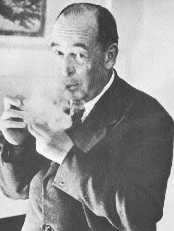“Let no Baptist preacher ever seek to reimpose these barriers [priestly acts] that Jesus removed at so great a cost.These are good words of reminders especially since the culture of self-aggrandizement continues to be encouraged in pastoral circles. This is worsened in situations where pastors think they are the only ones who hear from God and can simply tell their people God has told them to do something and the people should obey. The New Testament does uphold significant pastoral authority but only as it is rooted in the Scriptures. When pastors suggest their inner promptings are authoritative we might as well return to a Pope! Johnson even says (writing in 1954!):
I believe Baptist laymen everywhere would like for me to say to young preachers here today, ‘Remember always, you are not a priest.’ You are God’s messenger to preach Christ as our only priest. . . . never get the idea that you are part human and part divine. Remember that no church congregation is obligated to follow your will rather than God’s will.”
“So never yield to that human temptation to substitute your authority for God’s authority, or to claim your will to be God’s will, or to make your goals to be God’s goals, or to accept self-praise where God alone ought to be praised.”
“The greatest threat to our Baptist faith is our trend toward modernism in organization; the tendency to revert back to the priesthood and build a religious hierocracy.”
“Let us never forget that is was over-organized and over-commercialized religion that sent Jesus to the cross.”
These quotes also speak to the issue of what our churches need today- not primarily better organization or marketing. We simply need to teach and live the word of God, and we pastors can lead the way by actually taking the cues for pastoral ministry from the Bible- teach the Word, shepherd the flock, live holy. Then God will do His part.




